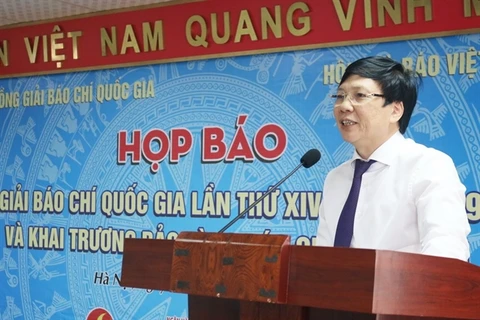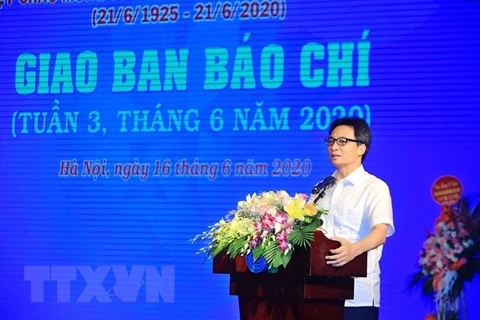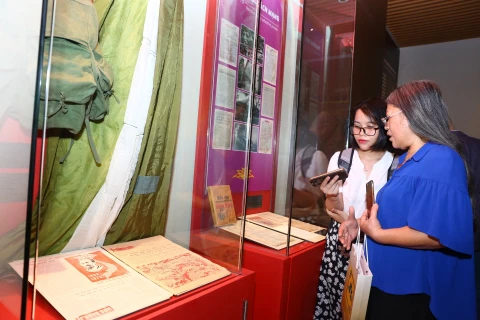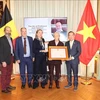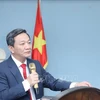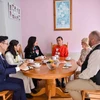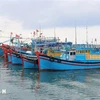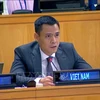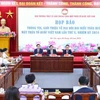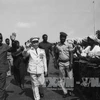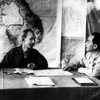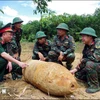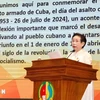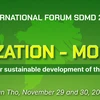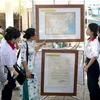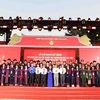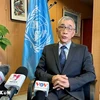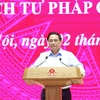Hanoi (VNA) – During the resistance war for national independence and freedom, the first generations of revolutionary journalists surmounted countless dangers and hardships, helping Vietnam’s revolutionary press grow strongly even during the fiercest time of the resistance war.
Performing tasks at military zones
The young and enthusiastic journalists carrying rice bags along with typewriters working in revolutionary bases are now over 90 years old. They gathered at a seminar held at the Hanoi-based Vietnam Press Museum on April 20, recalling the hard-but-glorious days.
Though weak in old age, the veteran journalists can till remember clearly major events and milestones during the wartime.
The seminar took the theme of “Vietnamese press 1946-1976: From Hanoi to Viet Bac revolutionary base.”
When the Viet Bac region, covering northern provinces of Cao Bang, Bac Kan, Lang Son, Tuyen Quang and Thai Nguyen, was turned into a revolutionary base, major press agencies in Hanoi such as the Vietnam News Agency (VNA) and the Quan doi Nhan dan (People’s Army) Newspaper move their headquarters to the base.
The Vietnam Journalists’ Association and the Huynh Thuc Khang press school were also established there. Other newspapers like Lao dong (Labour), Thanh nien (Young people) and Phu nu (Women) were formed later at the base.
99-year-old journalist-Colonel Nguyen Khac Tiep, who worked for the VNA and then the Quan doi Nhan dan newspaper, recalled the difficulties in the press work at that time.
Each war reporter had to carry their own rice, along with a rifle and a hoe when going to the battlefields, Tiep recalled.
Despite a range of hardships, the communication work received due attention during the war against French colonialists, he said, adding that each newspaper edition delivered to soldiers reflected the hard work of war correspondent.
 Journalist-Colonel Nguyen Khac Tiep, who worked for the VNA and then the Quan doi Nhan dan newspaper (Photo: VietnamPlus)
Journalist-Colonel Nguyen Khac Tiep, who worked for the VNA and then the Quan doi Nhan dan newspaper (Photo: VietnamPlus) Thai Duy, a former journalist of Cuu quoc (National salvation) newspaper, the predecessor of Dai Doan Ket newspaper, said Cuu quoc was the only daily at that time, which had only two pages.
He reminisced how the newspaper reported the corruption case relating to Tran Du Chau, an officer of the Ministry of National Defence, who was given death penalty, which was the first death penalty for corruption.
President Ho Chi Minh ordered no tolerance of officials who committed corrupt acts, regardless of their high-level positions, Duy said.
National Assembly – from the lens of revolutionary press
On this occasion, the Vietnam Press Museum displayed many documents and objects that have been made public for the first time, including a photo of President Ho Chi Minh with his autograph on the backside.
Tran Kim Hoa, Director of the museum, said the reporters-soldiers at revolutionary zones have become the pride of the national revolutionary press. They have recorded genuine and honest images of life during the resistance war, which are valuable archives, she said.
The 1946-1954 period began with an important historical event – the first general election of the Democratic Republic of Vietnam, which was held on January 6, 1946.
 The special issue celebrating the first National Assembly was published in November 1946. (Photo: VietnamPlus)
The special issue celebrating the first National Assembly was published in November 1946. (Photo: VietnamPlus) Valuable photos and reports reflected the enthusiastic atmosphere during the general election, which were published on the Quoc Hoi (National Assembly) newspaper. The newspaper was published only during the election.
 Quoi Hoi newspaper was published only on the occasion of the first general election. (Photo: VietnamPlus)
Quoi Hoi newspaper was published only on the occasion of the first general election. (Photo: VietnamPlus) Visiting the exhibition, journalist-Colonel Tran Hong said he was deeply moved by the mementoes which are associated with generations of journalists, such as manuscripts, autographs, press works, newspapers that were born in different periods and involved blood, sweat and tears of many generations of journalists.
“This is also a place to educate the next generations of journalists and people about the courage and indomitable spirit of Vietnamese journalists," Hoa said.
The exhibition will run until June 21./.



